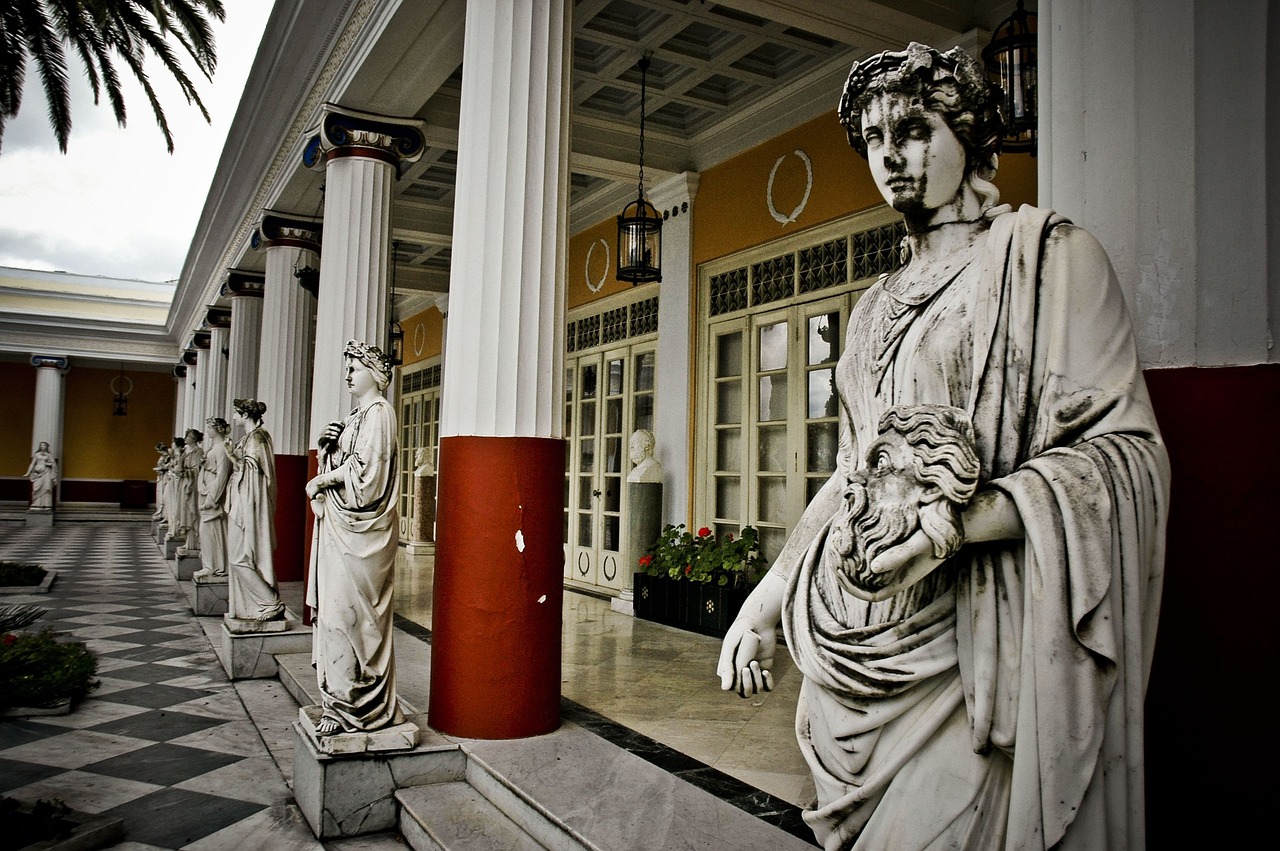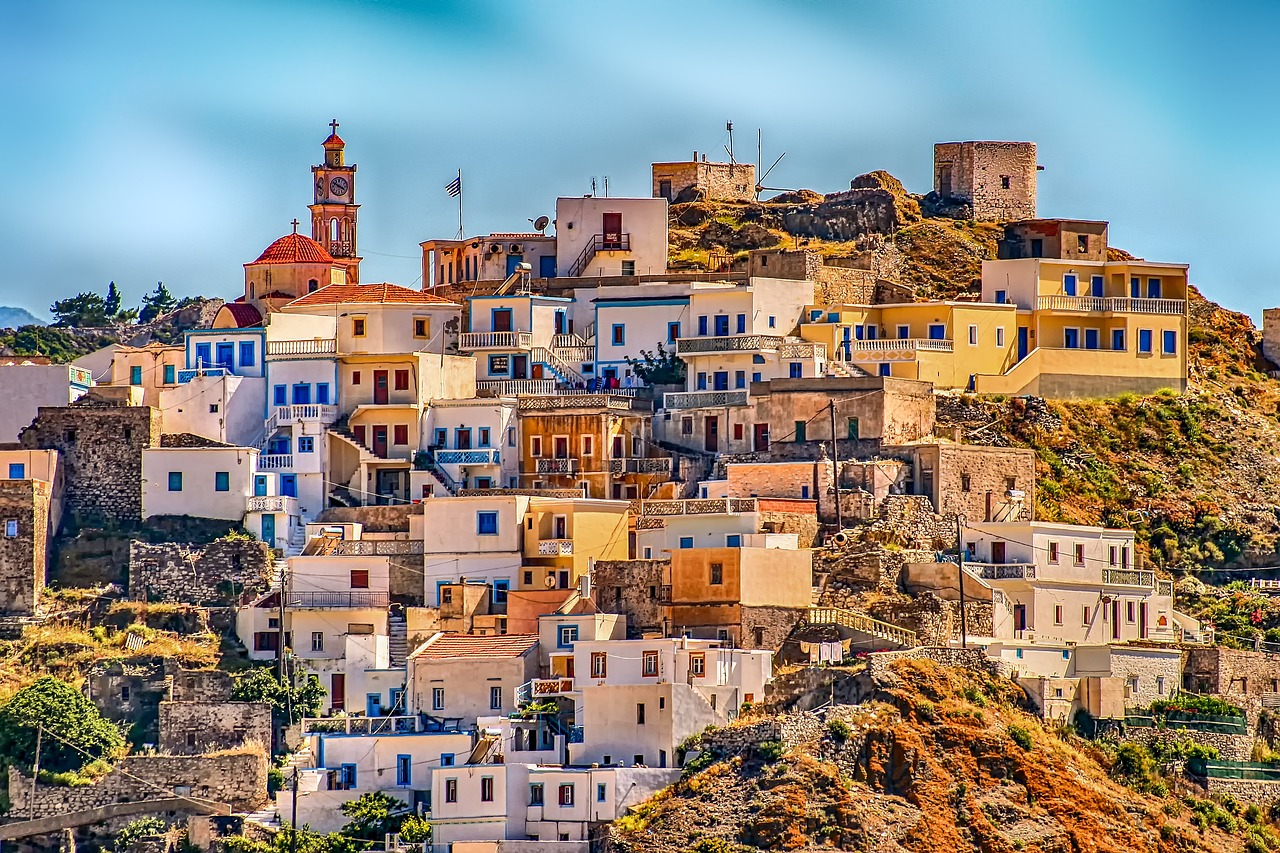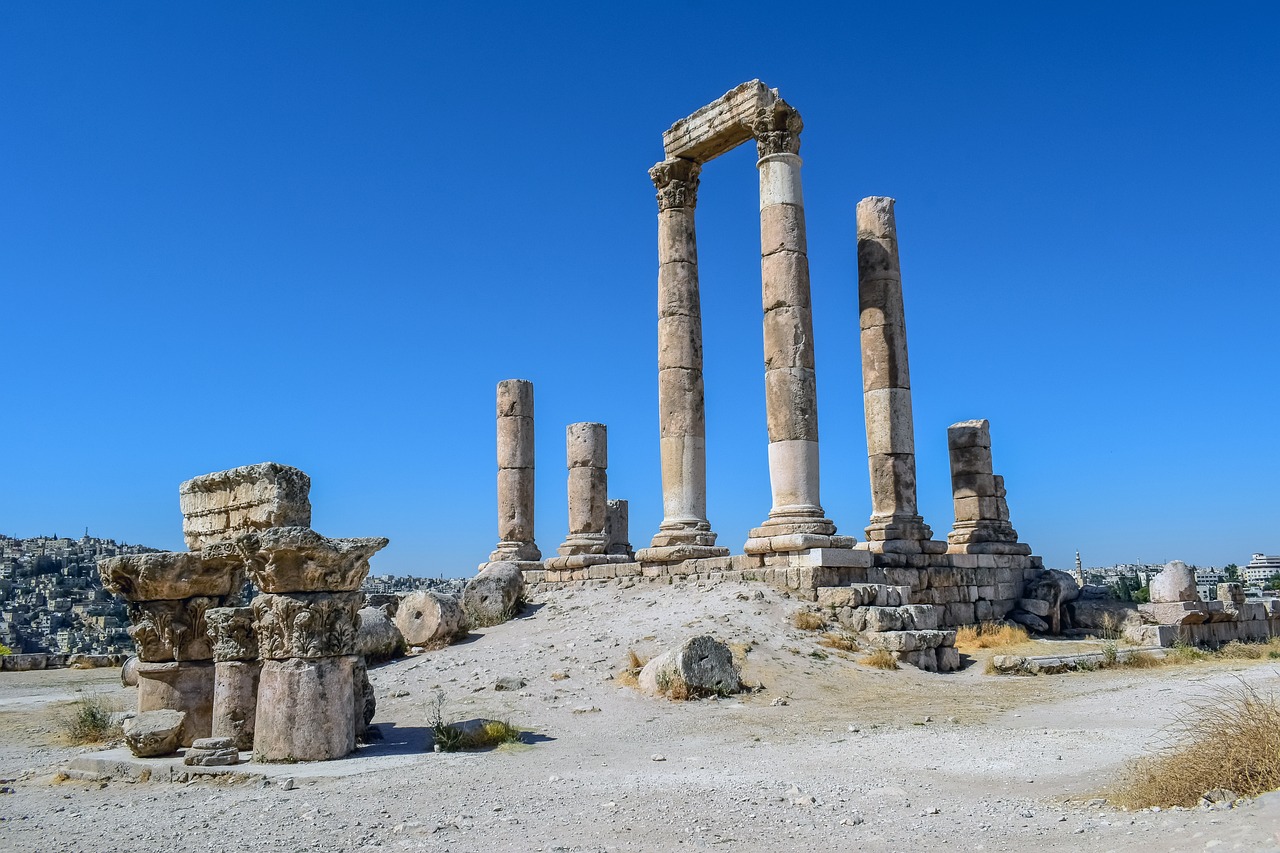The Influence of Ancient Greece on Political Philosophy and Art
Ancient Greece, with its rich history and intellectual legacy, has left an indelible mark on both political philosophy and art. The ancient Greek civilization, known for its advancements in various fields, significantly influenced the development of modern governance and artistic expression. The profound impact of Greek thought and creativity continues to resonate in contemporary society, shaping our understanding of politics, ethics, and aesthetics.

Ancient Greek Political Philosophy
Ancient Greek political philosophy holds a significant place in the history of governance and societal organization. The philosophical ideas put forth by thinkers such as Plato and Aristotle continue to shape political thought and systems around the world. Plato, in his work "The Republic," delved into the concept of an ideal state governed by philosopher-kings, advocating for justice and the common good. Aristotle, on the other hand, explored the principles of democracy, oligarchy, and tyranny, analyzing the strengths and weaknesses of each form of government.
One of the key contributions of ancient Greek political philosophy was the emphasis on the participation of citizens in the decision-making process. The idea of democracy, originating in Athens, highlighted the importance of individual rights, equality before the law, and the collective voice of the people in governance. This concept of citizen engagement in political affairs laid the groundwork for modern democratic systems, where the will of the majority is a guiding principle in decision-making.
Moreover, Greek political philosophy pondered fundamental questions about the role of the state in society and the nature of justice. Discussions on the ideal relationship between the individual and the community, the distribution of power, and the pursuit of the common good were central to philosophical debates in ancient Greece. These inquiries continue to resonate in contemporary political discourse, shaping policies and ideologies that seek to balance individual liberties with societal welfare.
Ancient Greek political philosophy not only provided a theoretical framework for governance but also inspired practical implementations of democratic principles. The legacy of thinkers like Socrates, Plato, and Aristotle serves as a guiding light for those who seek to understand the complexities of power, justice, and the responsibilities of both rulers and citizens in a just society.

Ancient Greek Artistic Achievements
Ancient Greek Artistic Achievements encompass a wide array of disciplines that have left an indelible mark on the world of art. From the intricate details of marble sculptures to the grandeur of architectural masterpieces, Greek art has long been celebrated for its beauty, harmony, and profound symbolism.
One of the most iconic forms of Greek art is sculpture, where artists skillfully captured the human form with remarkable precision and emotion. The statues of gods, goddesses, and mythological figures not only showcased the technical prowess of the sculptors but also conveyed powerful narratives and ideals.
In addition to sculpture, Greek architecture stands out for its innovation and elegance. The temples, theaters, and public buildings of ancient Greece were designed with meticulous attention to proportion, balance, and aesthetic appeal. The columns, friezes, and pediments of structures like the Parthenon exemplify the architectural excellence of the era.
Furthermore, Greek pottery is another significant artistic achievement that reflects the creativity and craftsmanship of the ancient Greeks. Decorated with intricate patterns, scenes from mythology, and everyday life, Greek pottery served both functional and aesthetic purposes, showcasing the artistic sensibilities of the culture.
Moreover, the art of ancient Greece was not just about aesthetics but also about storytelling and symbolism. Mythological themes permeated much of Greek art, providing artists with a rich source of inspiration to explore human experiences, emotions, and the mysteries of the universe.
Overall, the artistic achievements of ancient Greece continue to inspire and captivate audiences worldwide, serving as a testament to the enduring legacy of Greek creativity and innovation.

The Parthenon: Icon of Greek Art and Architecture
Ancient Greece had a profound impact on political philosophy and art, shaping the foundations of modern governance and artistic expression. This article explores the enduring influence of Greek thought and creativity on contemporary society.
Greek political philosophy laid the groundwork for democratic principles and systems of governance still prevalent today. Philosophers like Plato and Aristotle explored concepts of justice, equality, and the role of the state in society.
The artistic achievements of ancient Greece, including sculpture, architecture, and pottery, continue to inspire artists and architects worldwide. Greek art emphasized beauty, harmony, and the celebration of human form and expression.
The Parthenon, a temple dedicated to the goddess Athena, stands as a symbol of ancient Greek architectural prowess and artistic vision. Its design and proportions reflect the ideals of balance, symmetry, and aesthetic perfection.
Athens, the birthplace of democracy, exemplified a unique form of government where citizens participated in decision-making processes. The Athenian model of democracy influenced political systems across the globe, emphasizing civic engagement and individual rights.
Socrates, a prominent figure in ancient Greek philosophy, introduced the Socratic method of questioning and critical thinking. His teachings on ethics, morality, and self-awareness continue to shape philosophical discourse and intellectual inquiry.
Greek mythology, with its rich tapestry of gods, heroes, and epic narratives, inspired countless works of art and literature. Artists drew upon mythological themes to explore human experiences, emotions, and the complexities of existence.
Ancient Greek theater, with its genres of tragedy and comedy, provided a platform for exploring societal issues, human emotions, and moral dilemmas. Playwrights like Sophocles and Aristophanes crafted enduring works that continue to resonate with audiences today.
The ancient Olympic Games, held in honor of the god Zeus, combined athletic competition with artistic expression, fostering a sense of unity and cultural pride among Greek city-states. The legacy of the Olympics endures as a testament to the enduring influence of ancient Greece.

Democracy in Ancient Athens
Ancient Athens, known as the cradle of democracy, revolutionized the concept of governance by establishing a system where citizens actively participated in decision-making processes. Unlike many contemporary societies, where power was concentrated in the hands of a few, Athenian democracy valued the voice of every eligible citizen. This inclusive approach to governance set a precedent for modern democratic principles, emphasizing the importance of civic engagement and individual rights.
At the heart of Athenian democracy was the **Ekklesia**, a popular assembly where citizens gathered to debate and vote on important issues. This direct form of democracy allowed ordinary people to have a say in the governing of their city-state, fostering a sense of community and shared responsibility. The **Isegoria**, or equal right to speak, ensured that every citizen had the opportunity to express their opinions, regardless of social status.
The **Athenian legal system** also played a crucial role in upholding democratic values. Courts comprised of randomly selected citizens judged legal cases, promoting fairness and impartiality in the administration of justice. This system of **jury trials** empowered ordinary citizens to serve as both judges and jurors, reinforcing the idea that justice should be dispensed by the people themselves.
Moreover, the concept of **political ostracism** in ancient Athens demonstrated a commitment to preserving democracy by allowing citizens to vote for the temporary exile of individuals deemed a threat to the democratic order. This practice served as a safeguard against tyranny and abuse of power, reflecting the Athenians' dedication to upholding the principles of democracy.

The Legacy of Socrates and the Socratic Method
Ancient Greece had a profound impact on political philosophy and art, shaping the foundations of modern governance and artistic expression. This article explores the enduring influence of Greek thought and creativity on contemporary society.
Greek political philosophy laid the groundwork for democratic principles and systems of governance still prevalent today. Philosophers like Plato and Aristotle explored concepts of justice, equality, and the role of the state in society.
The artistic achievements of ancient Greece, including sculpture, architecture, and pottery, continue to inspire artists and architects worldwide. Greek art emphasized beauty, harmony, and the celebration of human form and expression.
The Parthenon, a temple dedicated to the goddess Athena, stands as a symbol of ancient Greek architectural prowess and artistic vision. Its design and proportions reflect the ideals of balance, symmetry, and aesthetic perfection.
Athens, the birthplace of democracy, exemplified a unique form of government where citizens participated in decision-making processes. The Athenian model of democracy influenced political systems across the globe, emphasizing civic engagement and individual rights.
Socrates, a prominent figure in ancient Greek philosophy, introduced the Socratic method of questioning and critical thinking. His teachings on ethics, morality, and self-awareness continue to shape philosophical discourse and intellectual inquiry.
Greek mythology, with its rich tapestry of gods, heroes, and epic narratives, inspired countless works of art and literature. Artists drew upon mythological themes to explore human experiences, emotions, and the complexities of existence.
Ancient Greek theater, with its genres of tragedy and comedy, provided a platform for exploring societal issues, human emotions, and moral dilemmas. Playwrights like Sophocles and Aristophanes crafted enduring works that continue to resonate with audiences today.
The ancient Olympic Games, held in honor of the god Zeus, combined athletic competition with artistic expression, fostering a sense of unity and cultural pride among Greek city-states. The legacy of the Olympics endures as a testament to the enduring influence of ancient Greece.
Socrates, one of the most influential philosophers in history, left behind a legacy that continues to shape intellectual discourse. His method of questioning, known as the Socratic method, challenged individuals to think critically and examine their beliefs. By engaging in dialogues that probed deeper into the nature of truth, morality, and knowledge, Socrates encouraged self-reflection and the pursuit of wisdom.

Greek Mythology and Its Influence on Art
Greek mythology, with its rich tapestry of gods, heroes, and epic narratives, has served as a wellspring of inspiration for artists throughout history. The myths and legends of ancient Greece provided a fertile ground for artistic expression, allowing artists to delve into the depths of human experience and emotion.
One of the most prominent themes in Greek mythology is the interplay between gods and mortals, a dynamic that reflects the complexities of human nature. Artists drew upon these mythological stories to create works of art that explored themes of love, jealousy, heroism, and tragedy.
From the captivating adventures of Odysseus to the tragic tale of Oedipus, Greek mythology offered a treasure trove of narratives that artists could reinterpret and reimagine in their own unique styles. Sculptors, painters, and poets found endless inspiration in the exploits of gods like Zeus, Athena, and Apollo, as well as mortal heroes like Hercules and Perseus.
The influence of Greek mythology on art extended beyond just storytelling. Artists also drew upon the symbolism and allegory present in these myths to convey deeper meanings and truths about the human condition. Mythological figures and motifs became powerful symbols that could evoke a wide range of emotions and ideas.
Furthermore, the enduring popularity of Greek mythology ensured that these stories remained relevant across different time periods and cultures. Artists in the Renaissance, for example, often looked to ancient Greek myths for inspiration as they sought to revive classical ideals of beauty and harmony in their works.
In essence, Greek mythology served as a well of creativity and imagination for artists, allowing them to tap into universal themes and emotions that transcended time and space. The influence of these ancient myths on art can still be seen today, as contemporary artists continue to draw inspiration from the timeless stories of the Greek gods and heroes.

Theater in Ancient Greece: Tragedy and Comedy
Ancient Greek theater, with its renowned genres of tragedy and comedy, played a pivotal role in the cultural and social fabric of ancient Greece. The theater was not merely a form of entertainment but a platform for exploring profound societal issues, delving into the depths of human emotions, and presenting moral dilemmas in a compelling manner. Playwrights such as Sophocles and Aristophanes crafted enduring works that continue to resonate with audiences across centuries.
Tragedy, a genre deeply rooted in Greek theater, focused on the suffering and downfall of protagonists due to their tragic flaws or external circumstances. These plays evoked a sense of catharsis in the audience, allowing them to experience intense emotions and reflect on the complexities of human existence. Tragedies like Sophocles' "Oedipus Rex" and Euripides' "Medea" are prime examples of the genre's enduring impact.
On the other hand, comedy in ancient Greek theater offered a lighter tone, often satirizing societal norms, political figures, and cultural practices. Comedic plays provided much-needed comic relief to audiences while also serving as a critique of contemporary issues. Aristophanes, known for his sharp wit and social commentary, created comedic masterpieces like "Lysistrata" and "The Clouds."
Through the interplay of tragedy and comedy, ancient Greek theater not only entertained but also challenged and provoked thought. The performances were a reflection of the society's values, beliefs, and struggles, offering a mirror to the audience to contemplate their own lives and choices. The enduring legacy of Greek theater lies in its ability to transcend time and culture, speaking to universal themes and human experiences.

The Olympic Games: A Celebration of Greek Art and Athletics
The Olympic Games in ancient Greece were not just about athletic competition; they were a grand celebration of art, culture, and athleticism. Held every four years in honor of the king of the gods, Zeus, the Olympics brought together Greek city-states in a display of unity and pride. The games featured a variety of sporting events, including running, wrestling, chariot races, and discus throwing, showcasing the physical prowess and skill of the participants.
However, the Olympics were not just about sports; they also highlighted the artistic talents of the Greeks. Alongside the athletic competitions, there were artistic contests in disciplines such as music, poetry, and sculpture. These competitions served as a platform for artists to showcase their creativity and skill, adding a cultural dimension to the festivities.
One of the most iconic symbols of the ancient Olympic Games was the olive wreath, awarded to victors as a symbol of their triumph. This simple yet powerful symbol represented not only athletic achievement but also cultural and artistic excellence, reflecting the holistic approach of the Greeks to celebrating both physical and creative endeavors.
The Olympic Games were more than just a sporting event; they were a reflection of the values and ideals of ancient Greek society. By combining art and athletics in a grand celebration, the Olympics emphasized the importance of physical fitness, artistic expression, and cultural unity. The legacy of the ancient Olympics continues to inspire modern sporting events and artistic endeavors, serving as a testament to the enduring influence of Greek art and athletics.
Frequently Asked Questions
- What is the significance of Ancient Greek political philosophy?
Ancient Greek political philosophy laid the foundation for democratic principles and systems of governance that are still influential today. Philosophers like Plato and Aristotle explored concepts of justice, equality, and the role of the state in society, shaping modern political thought.
- How did Ancient Greek art influence contemporary artistic expression?
Ancient Greek artistic achievements in sculpture, architecture, and pottery continue to inspire artists and architects worldwide. Greek art emphasized beauty, harmony, and the celebration of human form and expression, setting a standard for artistic excellence that endures to this day.
- What is the significance of the Parthenon in Greek art and architecture?
The Parthenon, a temple dedicated to the goddess Athena, is an iconic symbol of ancient Greek architectural prowess and artistic vision. Its design and proportions reflect the ideals of balance, symmetry, and aesthetic perfection, showcasing the pinnacle of Greek architectural achievement.
- How did Greek mythology influence art and literature?
Greek mythology, with its rich tapestry of gods, heroes, and epic narratives, inspired countless works of art and literature. Artists drew upon mythological themes to explore human experiences, emotions, and the complexities of existence, creating enduring masterpieces that resonate with audiences across generations.
- What role did theater play in Ancient Greek society?
Ancient Greek theater, with its genres of tragedy and comedy, provided a platform for exploring societal issues, human emotions, and moral dilemmas. Playwrights like Sophocles and Aristophanes crafted enduring works that continue to provoke thought and evoke emotions in audiences today.
- How did the Olympic Games reflect Greek art and culture?
The ancient Olympic Games, held in honor of the god Zeus, combined athletic competition with artistic expression, fostering a sense of unity and cultural pride among Greek city-states. The legacy of the Olympics serves as a testament to the enduring influence of ancient Greek art, athletics, and cultural values.



















